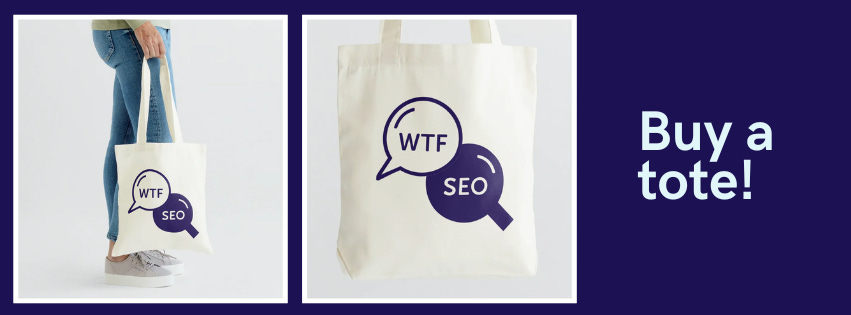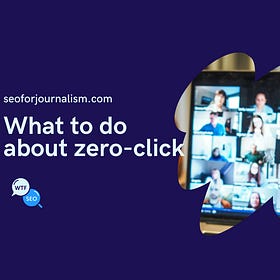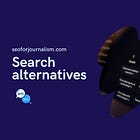What is zero-click search?
We explain what publishers need to know about zero-click search and how news SEOs are reacting
Pleasssssssse help us get the totes out of Jessie’s house! Please!
Show your support for WTF is SEO? in the wild. Get one of our limited edition branded totes.
Hello, and welcome back. Jessie here, back after a stunning weekend in Toronto. The countdown to winter might be on, but for now it’s just lattes on cafe patios, walks in parks and the final (😭😭) few softball games.
This week: What is zero-click search! In recent years, Google’s infusion of artificial intelligence at the centre of its Search products has scared publishers and caused concern of a clickless world. We explain what publishers need to know and how SEO experts are reacting to it.

Let’s get it.
In this issue:
What is zero-click search?
Why it matters
What SEO experts are saying
THE 101
What is zero-click search?
Zero-click search is when a user inputs a query or prompt and Google provides a satisfactory answer directly on the search results page.
This often happens with informational queries (“what time is it in NYC?” or “Life of a Showgirl release date”) where the answer is straightforward. Google delivers answers to these queries right in the SERP with features like AI Overviews, Featured Snippets or Knowledge Panels, and in AI Mode.
While zero-click results can eliminate friction for users, they pose a challenge for publishers. Instead of exploring a piece of journalism more in-depth, a reader can simply fill a knowledge gap and move on. This removes the need for click-through to a publisher’s website.
It’s not an entirely new trend. Google has long had SERP features like Featured Snippets or People Also Ask, which provide answers without requiring a click. But it has increased. A SparkToro report in 2024 found that nearly 60 per cent of all Google searches in the U.S. ended without a click. In contrast, a 2022 study from Semrush had that figure was about 26 per cent on desktop and 17 per cent on mobile.
Why does zero-click search matter?
While not a new concept, what’s changed recently is the acceleration of zero-click searches, driven by the global rollout of AI Overviews and AI Mode, and how increasingly effective Google is at keeping users on its platforms. Against this backdrop, publishers around the world are reporting declining traffic (and, ultimately, revenue).
Ahrefs has reported that AI Overviews alone can slash clicks by nearly 35 per cent. Given that most AI Overviews are triggered on informational searches, this poses a serious threat to sites who rely heavily on that type of content.
AI Mode cuts the need to click even further. News/Media Alliance called links in traditional results the “last redeeming quality of search” and accused Google of theft. “Google just takes content by force and uses it with no return, the definition of theft,” it said in the report.
Data suggests that Google’s results are increasingly “self-referential” — meaning they send clicks to their own products. This includes sending users to Google Flights instead of flight-tracking sites for a keyword like "cheap flights to nyc," or an AI Overview summary prompting a secondary Google search versus a link to a different webpage.
Altogether, this rapid acceleration has fundamentally changed the search ecosystem.
It upended the long-established deal: in exchange for visibility on the most valuable real estate on the internet (Google), news sites allowed their content to power the results pages.
This exchange of traffic for content was the norm, and many sites built businesses on the continued expectation traffic from Google's ecosystem (supported by ads/paywalls). The movement to a zero-click future makes it hard for many publishers to sustain their existing business models.
THE EXPERT OPINIONS
What are news SEOs saying about zero-click search?
As reports about the threat of a "traffic apocalypse" suggest, many are worried about how rapidly Google is changing. It is moving fast and some sites are struggling to adapt.
Against this backdrop of rapid change, we asked some notable names in news SEO for their thoughts on zero-click search and the possibility of Google Zero.
Barry Adams: “Zero click is useful as a concept to frame how we’ve reached and passed peak search and the battle for clicks will only get tougher. But actual ’zero clicks’ will never happen. Search will always be a very good source of traffic and for the time being, will continue to be the dominant channel.”
Anne Berlin: Zero-click search “requires a dramatic overhaul to editorial strategy. Your audience has to want to read your take, not just glean the highlights from an amalgamation. That means personality, perspective and readability have to exceed the experience being provided on the SERP. This is not a new perspective. But it's one many newsrooms haven't internalized.”
Harry Clarkson-Bennett: “Zero-click searches are not new — but AI Mode will be the culmination of the trend. But any user that can be satisfied without having to click is unlikely to be a high quality user — a net negative for advertising and affiliate models.” How much to worry “depends on your business model and how reliant you are on the types of queries that can be synthesized so easily.”
Deborah Carver: “Start planning for significantly less traffic from Google. Stop chasing the dragon of platform-reliant referral traffic. [F]ocus on building websites that people want to return to. I can't emphasize how important user experience and audience loyalty are to a digital publisher's sustainability. If someone finds you from Google or a social media site, do your best to keep them on page! You don't need rabid fans, but you need an audience who relies on your original information and value. Seek out return direct visitors.”
Agustín Gutierrez: “Google wants users to consume content directly in its search engine without leaving. Zero-click was the first step, now being deepened with AI Overviews. Stories about the time of a sporting event, or release of a Netflix series will get fewer clicks. Everyone is trying to build community through concrete actions — except publishers (or at least most of them).”
Dana Allegretti: “It's going to require a dramatic overhaul in long-term strategy. Newsrooms can't put their head in the sand and wait for this to get better. They need to be experimenting with every tool available right now to find something to keep it going.”
The bottom line: A zero-click search happens when readers no longer need to click into a publisher site to satisfy their query. It’s more common now than ever, especially with the rise of AI Overviews and AI Mode. In future newsletters, we’ll continue to explore ways publishers can and should respond to this traffic threat.
#SPONSORED - The Classifieds
Get your company in front of more than 13,000 writers, editors and digital marketers working in news and publishing. Sponsor the WTF is SEO? newsletter.
THE JOBS LIST
These are audience jobs in journalism. Want to include a position for promotion? Email us.
Daybook is hiring a Social Media Producer (U.S.).
Hearst Magazines Division Careers is hiring a Content Strategy Manager, Lifestyle (New York. N.Y. (hybrid)).
The Times is hiring a Head of Social Strategy (Editorial) (London, U.K.).
RECOMMENDED READING
Google news and updates
🤖 Reece Rogers: Google injects Gemini into Chrome as AI browsers go mainstream.
🤖 Google: Go behind the browser with Chrome’s new AI features.
🤖 Matt G. Southern: Discover adds social media posts and follow buttons.
🤖 Google: Catch up with the creators and publishers you care about on Discover.
🤖 Glenn Gabe: “Oh boy, this is not good for third-party tools.” Google is hiring an anti-scraping analyst.
🤖 Brodie Clark: “There’s been some massive fluctuations to data in GSC.”
Even more recommended reading
📖 Vipin SJ: What’s new in the Wikipedia Library? The Wall Street Journal.
📹 Stephanie Wallace: The SEO shift you can't ignore: Video is becoming source material.
🧑🤝🧑 Robert Hart: Reddit wants to trade users for AI data.
🏋️ INN: INN is hosting Better Together, a day-long workshop.
⚒️ Alli Berry: How to measure brand marketing efforts (and prove their ROI).
What did you think of this week's newsletter?
(Click to leave feedback.)
Catch up: Last week’s newsletter
Have something you’d like us to discuss? Send us a note on Twitter (Jessie or Shelby) or to our email: seoforjournalism@gmail.com.
Written by Jessie Willms and Shelby Blackley









We think SEO is Dead
seoisdead.com